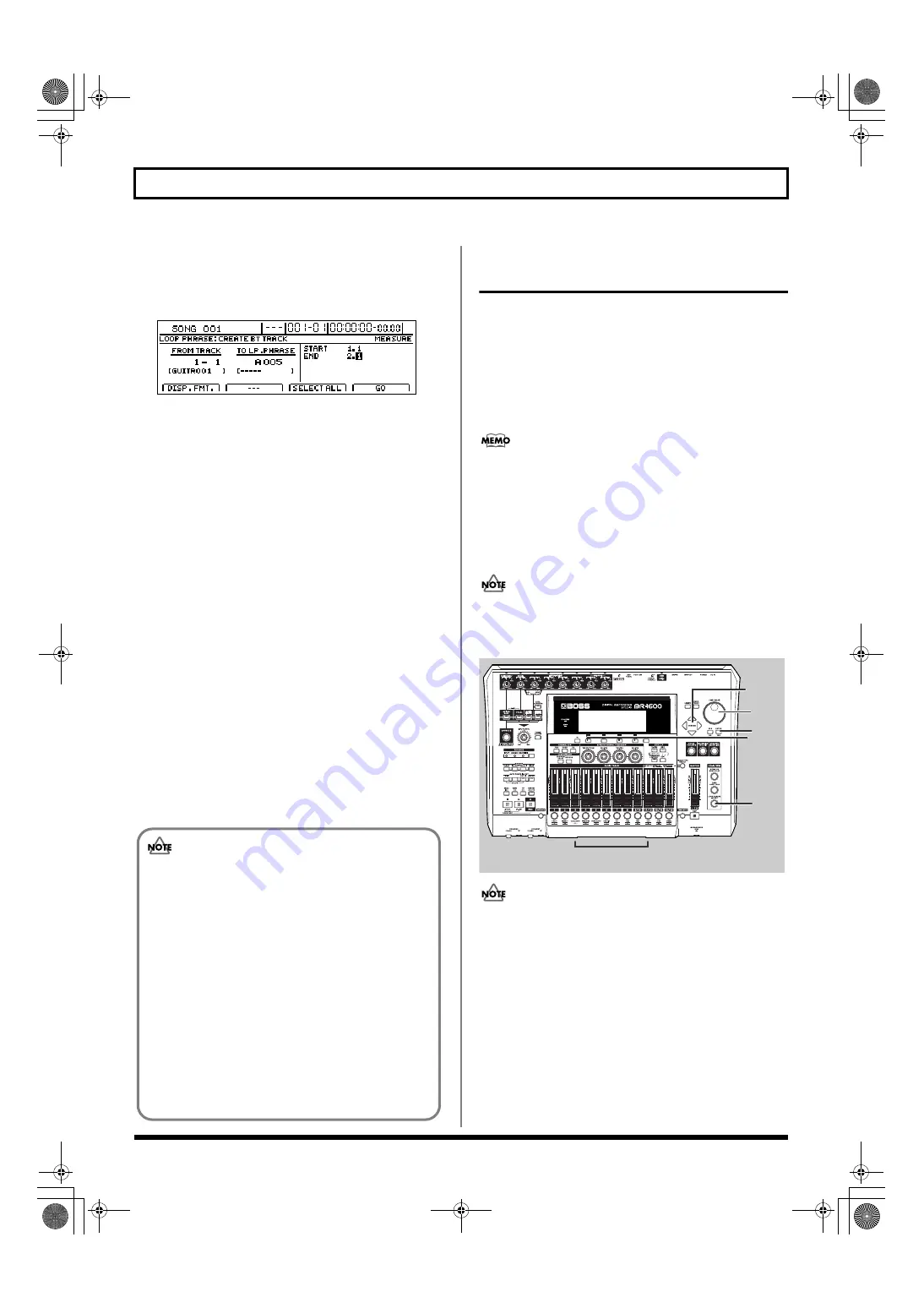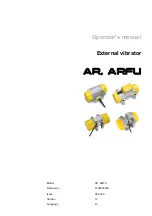
180
Creating Loop Phrases
5.
Move the cursor to the right half of the screen, and then
use [CURSOR] and the TIME/VALUE dial to set the
start and end time positions of the portion of audio to
be used as the Loop Phrase.
fig.20-092d
Pressing [F1] (DISP.FMT.) at this time will allow you
select how the positions will be specified (i.e., by
measure, time, or marker).
The following parameters should now be set.
START (Start point):
Use this parameter to specify the start position within
the source track.
END (End point):
Use this parameter to specify the end position within the
source track.
If time values are used to specify the above points and
you then switch the specification method to measures or
markers, a plus (+) character may be displayed to warn
that indicated positions and actual positions are not the
same. If you want to specify points using measures or
markers, this discrepancy can be eliminated by using the
TIME/VALUE dial to make settings in each of the
relevant screens.
If you want to set the Loop Phrase as extending from the
start to the end of the song, press [F3] (SELECT ALL).
6.
Press [F4] (GO).
The BR-1600CD will begin creating the Loop Phrase.
When the message “Complete!” appears, it indicates that
the phrase has been successfully created.
Using wave data on a CD-ROM/
R/RW disc (Loop Phrase Import)
If the audio data you want to use for a Loop Phrase is
contained as an AIFF or WAV file on a CD-ROM, CD-R, or
CD-RW disc, this data can be easily imported into a selected
phrase.
Using this function, you will be able to import audio data
from commercially available sampling CDs and from CD-R
or CD-RW discs that you have created using a PC.
Only data of the following format can be imported.
• WAV or AIFF audio
• Mono or stereo
• 8 or 16 bit
• 44.1 kHz sampling rate
• 0.5 seconds to 30 minutes in length.
CD-R/RW discs of ISO9660 Level 2, Mode 1 format are
supported for import. It will not be possible to import
data from discs of any other format.
fig.20-093
The name of the audio data file will be originally
assigned to the destination Loop Phrase. For more
details regarding the method for changing phrase
names, refer to “Specifying and modifying the source
loop phrase (Time Modify)” (p. 182).
1.
Insert a CD-ROM, CD-R, or CD-RW containing audio
data in WAV or AIFF format into the BR-1600CD’s CD-
R/RW drive.
The drive’s access indicator will begin to flash. Wait until
this indicator stops flashing and turns off before
proceeding.
• If the Loop Phrase selected for creation already
contains data, this will be overwritten by the audio
data from the source track. As it will not be possible
to restore this data, care should be taken to ensure
that important Loop Phrases are not accidentally
overwritten in this way.
• If the current song contains newly recorded audio
data or newly modified settings, the message “Save
Current?” may be displayed during the above
procedure. If you want to store your audio data and
settings, press [ENTER/YES]. If this will not be
necessary, press [EXIT/NO].
If you press [EXIT/NO], a Loop Phrase is created
from the data most recently saved to the imported
source track. If there is no data saved, a silent Loop
Phrase is created.
2
3
4, 6, 8
3, 5, 7
7
1
BR-1600_R_e.book 180 ページ 2007年12月6日 木曜日 午前9時52分
Summary of Contents for Digital Recording Studio BR-1600 CD
Page 41: ...41 Section 1 Advanced Use Section 1 Advanced Use BR 1600_R_e book 41...
Page 73: ...73 Section 2 Using Effects Section 2 Using Effects BR 1600_R_e book 73...
Page 145: ...145 Section 3 Using Rhythm Section 3 Using Rhythm BR 1600_R_e book 145...
Page 203: ...203 Section 4 Using the CD R RW Drive Section 4 Using the CD R RW Drive BR 1600_R_e book 203...
Page 220: ...220 MEMO BR 1600_R_e book 220...
Page 221: ...221 Section 5 Using MIDI Section 5 Using MIDI BR 1600_R_e book 221...
Page 239: ...239 Section 6 Using USB Section 6 Using USB BR 1600_R_e book 239...
Page 272: ...272 MEMO BR 1600_R_e book 272...
Page 273: ...273 Appendices Appendices BR 1600_R_e book 273...
Page 309: ...309 MEMO BR 1600_R_e book 309...
















































